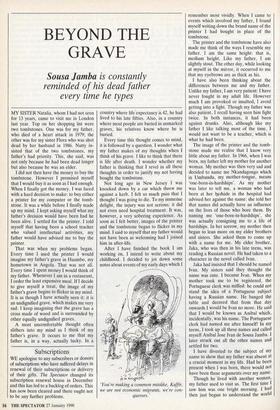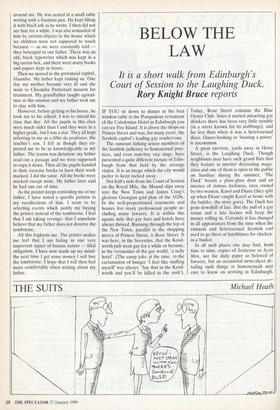BEYOND THE GRAVE
Sousa Jamba is constantly
reminded of his dead father every time he types
MY SISTER Natalia, whom I had not seen for 13 years, came to visit me in London last year. Top on her shopping list were two tombstones. One was for my father, who died of a heart attack in 1979; the other was for my sister Flora who was shot dead by her husband in 1986. Natty in- sisted that of the two tombstones, my father's had priority. This, she said, was not only because he had been dead longer but also because he was an elder.
I did not then have the money to buy the tombstone. However I promised myself that I would buy it as soon as I had enough. When I finally got the money, I was faced with a hard decision to make: to buy either a printer for my computer or the tomb- stone. It was a while before I finally made up my mind. I kept asking myself what my father's decision would have been had he been alive. I settled for the printer. I told myself that having been a school teacher who valued intellectual activities, my father would have advised me to buy the printer.
That was when my problems began. Every time I used the printer I would imagine my father's grave in Huambo, my hometown in Angola. That was not all. Every time I spent money I would think of my father. Whenever I am in a restaurant, I order the least expensive meal. If I decide to give myself a treat, the image of my father's grave begins to flicker in my mind. It is as though I have actually seen it: it is an undignified grave, which makes me very sad. I keep imagining that the grave has a cross made of wood and is surrounded by other equally undignified graves.
A most uncomfortable thought often slithers into my mind as I think of my father's grave. It occurs to me that my father is, in a way, actually lucky. In a
country where lifesexpectancy is 42, he had lived to his late fifties. Also, in a country where most people are buried in unmarked graves, his relatives know where he is buried.
Every time this thought comes to mind, it is followed by a question. I wonder what my father makes of my thoughts when I think of his grave. I like to think that there is life after death. I wonder whether my father is thinking that I revel in all these thoughts in order to justify my not having bought the tombstone.
Not long ago in New Jersey I was knocked down by a car which threw me against a kerb. I felt so much pain that I thought I was going to die. To my immense delight, the injury was not serious: it did not even need hospital treatment. It was, however, a very sobering experience. As soon as I felt better, images of the printer and the tombstone began to flicker in my mind. I said to myself that my father would not have been as welcoming had I joined him in after-life.
After I have finished the book I am working on, I intend to write about my childhood. I decided to jot down some notes about events of my early days which I `You're making a common misake, Kaffir, we are not economic migrants, we're con- querors.' remember most vividly. When I came to events which involved my father, I found myself writing down the brand name of the printer I had bought in place of the tombstone.
The printer and the tombstone have also made me think of the ways I resemble my father. I am the same height: that is, medium height. Like my father, I am slightly stout. The other day, while looking at myself in the mirror, it occurred to me that my eyebrows are as thick as his.
I have also been thinking about the differences between me and my father. Unlike my father, I am very patient: I have never fought in my adult life. However much I am provoked or insulted, I avoid getting into a fight. Though my father was also patient, I recall having seen him fight twice. In both instances, it had been against drunks. Also, although like my father I like talking most of the time, I would not want to be a teacher, which is what he had been.
The image of the printer and the tomb- stone made me realise that I know very little about my father. In 1966, when I was born, my father left my mother for another woman. My mother was then very sad and decided to name me Nkandagongo which in Umbundu, my mother-tongue, means `one-born-in-hardships'. As my mother was later to tell me, a woman who had been at her bedside in the hospital had advised her against the name: she told her that names did actually have an influence on the lives of those who bore them. By naming me 'one-born-in-hardships', she was actually consigning me to a life of hardships. In her sorrow, my mother then began to lean more on my elder brothers and sisters. She asked them to come up with a name for me. My elder brother, Jaka, who was then in his late teens, was reading a Russian novel. He had taken to a character in the novel called Ivan.
Jaka had insisted that I should be named Ivan. My sisters said they thought the name was cute. I became Ivan. When my mother ' took me to be registered, the Portuguese clerk was miffed: he could not stand the idea of a Portuguese subject having a Russian name, He banged the table and decreed that from that day onwards I would be Ivan no more. He said that I would be known as Anibal which, incidentally, was his name. The Portuguese clerk had named me after himself! In my teens, I took up all these names and called myself Anibal Jose Ivan de Sousa Jamba. later struck out all the other names and settled for two.
I have diverted to the subject of my name to show that my father was absent at a crucial moment in my life. Had he been present when I was born, there would not have been these arguments over my name.
Though he 'lived with another woman, my father used to visit us. The first time I saw him was one bright morning. I had then just begun to understand the world
around me. He was seated at a small table writing with a fountain pen. He kept filling it with black ink as he wrote. I then did not see him for a while. I was also reminded of him by certain objects in the house which we children were not supposed to touch because — as we were constantly told they belonged to our father. There was an old, black typewriter which was kept in a big carton box, and there were many books and papers kept in boxes.
Then we moved to the provincial capital, Huambo. My father kept visiting us. One day my mother became very ill and she went to Chisamba Protestant mission for treatment. My grandfather taught agricul- ture at this mission and my father took me to stay with him.
However, before getting to his house, he took me to his school. I was to attend his class that day. All the pupils in this class were much older than I and they were in a higher grade, but I was a star. They all kept referring to me as o filho do professor, the teacher's son. I felt as though they ex- pected me to be as knowledgeable as my father. The lesson was dictation: my father read out a passage and we were supposed to copy it down. Then all the pupils handed in their exercise books to have their work marked. I did the same. All the books were marked except mine. My father later said he had run out of time.
As the printer keeps reminding me of my father, I have noted a specific pattern in my recollections of him. I seem to be selecting events which justify my buying the printer instead of the tombstone. 1 feel that I am taking revenge: that I somehow believe that my father does not deserve the tombstone.
All this frightens me. The printer makes me feel that I am failing in one very important aspect of human nature — filial obligation. I have now made up my mind: the next time I get some money I will buy the tombstone. I hope that I will then feel more comfortable when writing about my father.



























































 Previous page
Previous page